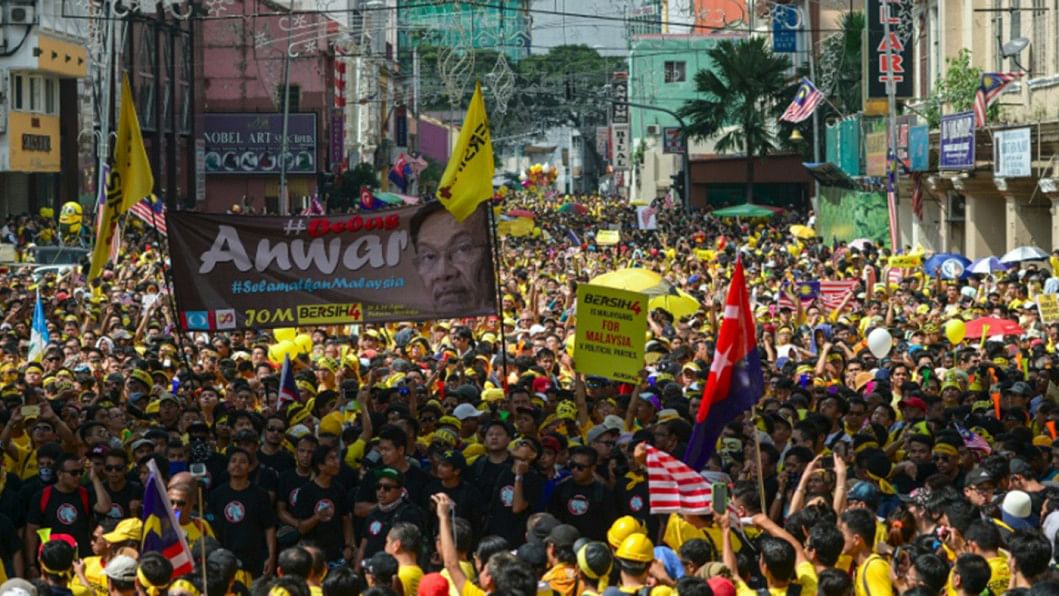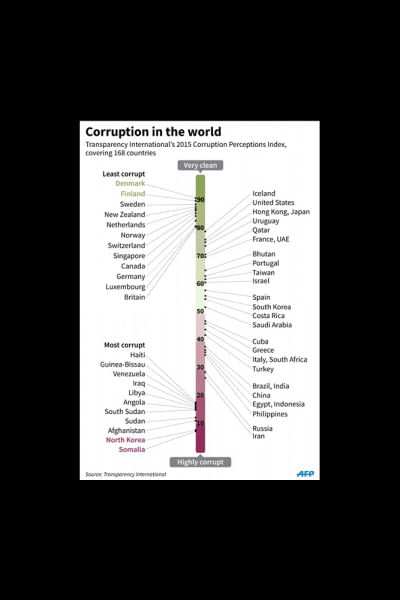Emerging giants plagued by corruption: TI

The world's "up and coming economies" are struggling to shake off corruption, an anti-graft watchdog warned today, citing massive scandals in Brazil and Malaysia as cause for concern.
In its "Corruption Perceptions Index 2015", Transparency International (TI) said the Latin American country showed the biggest decline in its ranking of 168 countries, slumping seven notches to 76th position over a kick-backs scandal engulfing state oil giant Petrobras.
On the other side of the globe, graft allegations surrounding Malaysian Prime Minister Najib Razak also laid bare corruption dogging the Asian state, it noted.
Overall, two-thirds of the countries measured by TI scored below the 50-point mark out of a top score of 100.
Nordic countries -- Denmark, Finland and Sweden -- topped the chart with their clean public sectors as in previous years, while strife-torn or repressive states -- Afghanistan, North Korea and Somalia -- brought up the rear.
Emerging giants, in particular, showed a worrisome picture in the index used widely used as a gauge of the level of corruption by governments, legal systems, political parties and bureaucracies.

"All the BRICS are challenged, the countries that are the really up and coming in the world economy, they all score below 50 in our index," Robin Hodess, TI group director for research, told AFP, referring to Brazil, Russia, India, China and South Africa.
South Africa took 61st place with 44 points. Brazil and India were tied at 76th place, with scores of just 38, while China fared slightly worse, at 83th place with 37 points. Russia only came in at 119th position, managing just 29 points.
Hodess noted that the Petrobras case has had a "tremendous impact... in the real uncovering of the way that the political networks and businesses have been covering up decades of corruption in the country".
"Things are starting to change, but this has been the scandal that brought Brazil into a difficult situation in terms of public sector perception of corruption."
The Latin American giant has been reeling over revelations that executives at Petrobras colluded with politicians and other businessmen to siphon off millions from the company through bribes and rigged contracts.
A massive probe dubbed "Operation Car Wash" has netted dozens of prominent figures, including high-ranking Congress members and executives at Petrobras and major construction firms.
President Dilma Rousseff herself has been investigated but so far emerged unscathed, although she was Petrobras chairwoman through much of the period when the corporation was at the centre of the embezzlement scheme.
'NOT ENOUGH POLITICAL WILL'
Meanwhile, hours ahead of the release of TI's latest index, Malaysia's top prosecutor cleared Prime Minister Najib of corruption, putting a spotlight on graft strangling the country's public sector.
In the long-running case that has gripped the nation, the attorney-general on Tuesday said some $681 million (628 million euros) that Najib received in his bank account were a personal donation from the Saudi royal family.
Najib has for months denied accusations that the payment was siphoned from a now struggling state-owned company he launched.
Samantha Grant, TI's Southeast Asia coordinator, said the verdict left key questions answered, including "why this donation was made".
"I think this case really highlights that kind of problem and the fact that while some measures have been taken, really getting to the bottom of the problem, and really working at the roots of corruption in Malaysia hasn't really been given enough political will and honest attention," she told AFP.
Transparency International urged the public to prod their governments to carry out much needed reforms to end the scourge of corruption.
"Overall we think it's very important that not only the government comes in with the reforms we are looking for -- the policy changes, and enforcing them, but that these countries pay attention to people, to the efforts of people on the ground," said Hodess.
She cited the example of Guatemala, where protests pushed president Otto Perez to stand down last year over graft allegations.
"The people can really make a big difference in drawing attention of elites to corruption issues, and we think in the long term it would make a big impact if people are part of the solution to corruption," added Hodess.

 For all latest news, follow The Daily Star's Google News channel.
For all latest news, follow The Daily Star's Google News channel. 








Comments